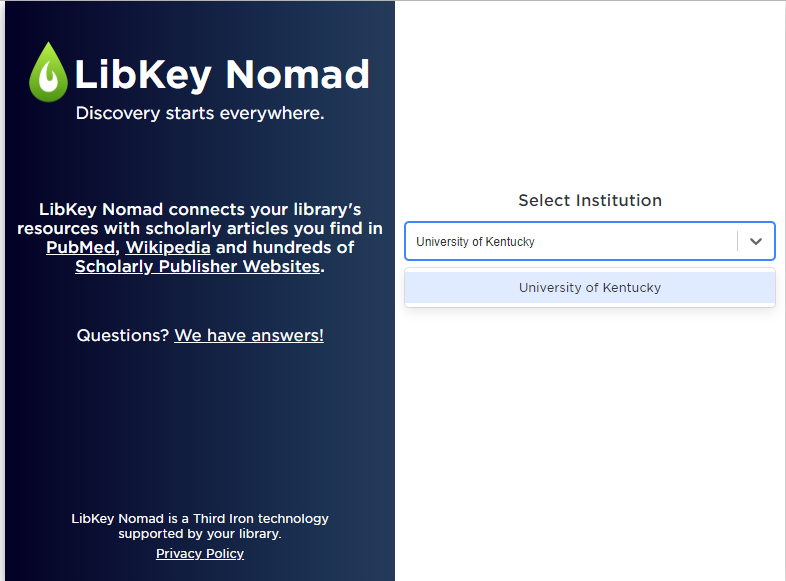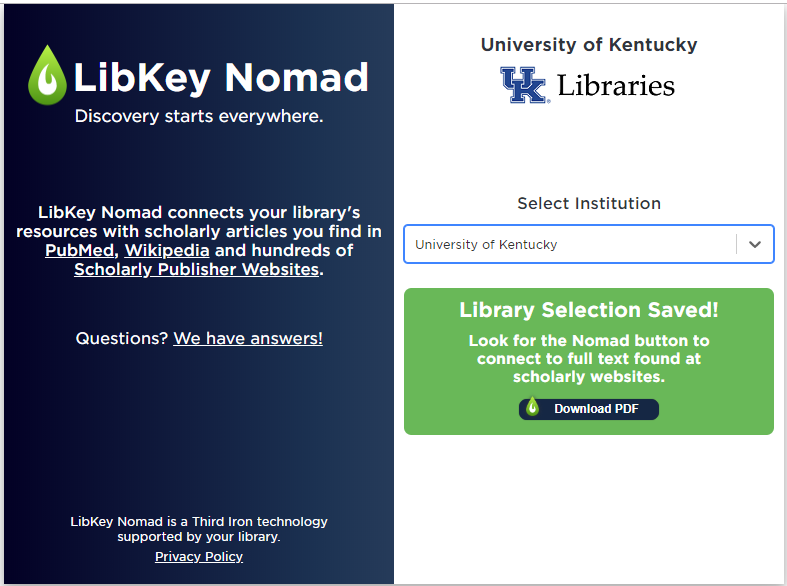My Library Account
What is My Library Account?
My Library Account allows you to see what materials you have checked out, renew materials online, and request books from one campus library to another. Use your Link Blue credentials to login to your My Library Account.
UK Libraries ILLiad
What is InterLibrary Loan (ILLiad)?
Interlibrary Loan/Document Delivery allows you to request articles from the University of Kentucky Libraries. In order to request articles, the ILLiad system requires a free, one-time registration.
How to setup an ILLiad account?
Use the First-Time Users page to register for ILLiad. Once you are registered, use the following link below (https://lib.uky.edu/ILLiad/) to log-on. If you have any questions please e-mail or call the Library Interlibrary Loan/Document Delivery at (859) 218-1880 or ILLBorrowing@uky.edu.
Special Collections Research Center Research Account
Anyone wishing to use SCRC materials, order digital scans, visit the Breckinridge Research Room, or use the Breckinridge Digital Studio must first create an SCRC Research Account. Depending on your relationship to UK, your registration method will vary.
Learn how to register your SCRC Research Account here:
LibKey Nomad
What is LibKey Nomad?
LibKey Nomad consults the UK Libraries holdings data to know if and where an article is available. You can install LibKey Nomad to your browser and access library collections (articles, journals, etc.) within one click. It even works when off campus!
LibKey Nomad also offers privacy safeguards, in that it:
- doesn’t require a personal account;
- doesn’t cache article requests or EZproxy credentials; and
- is only active when a user is on the website of a scholarly publisher or database (i.e., PubMed, CINAHL).
Install the Extension
- Download the extension from https://thirdiron.com/downloadnomad.
- Type in and select the University of Kentucky as your institution.

- That's it - now explore sites, search databases, and access via journal websites.
EndNote
What is EndNote Click?
EndNote Click is a free browser plugin that finds the best available PDF of an academic article while you browse. Behind the scenes, EndNote Click will search open databases and UK Libraries' subscriptions to find the best available paper for you. LibKey Nomad and EndNote Click complement one another. We recommend installing both to your browser.
Create an Account
You will need to create an EndNote Click Account.

Then you will need to select the University of Kentucky as your institution.

Now you should be able to access PDFs directly from resources like Google Scholar, PubMed, CINAHL, PsycInfo, and many more resources!
On-campus access
EndNote Click automatically detects your library subscriptions when you are on campus based on your IP address. You don't need to do anything.
Off-campus access
UK Libraries supports off campus access through EZproxy. You will be asked when off campus to login using your LinkBlue ID. You will only need to login the first time you use EndNote Click off-campus and after updates to the extension.
BrowZine
What is BrowZine?
BrowZine provides access to the scholarly journal content available through the University of Kentucky Libraries, providing an easy and familiar way to browse, read, save and monitor scholarly journals across the disciplines on your mobile device or desktop/laptop.
- BrowZineProvides access to the scholarly journal content available through the University of Kentucky Libraries, providing an easy and familiar way to browse, read, save and monitor scholarly journals across the disciplines on your mobile device or desktop/laptop.
Setup BrowZine on Your Mobile Device
BrowZine can be used through the browser to access journals, but downloading the mobile app allows you to access journals available through UK anywhere you are. After downloading the app you will need to create an account and affiliated it with UK. Once you have an account you add journals to your library bookshelf. Anytime there are new issue released of journals on your bookshelves you will be notified.
Find Journals Using Browzine
Setup ORCiD and Scopus IDs
ORCiD
What is ORCiD?
An ORCiD is a persistent and unique identifier for researchers. ORCiD provides a persistent digital identifier that distinguishes you from every other researcher and, through integration in key research workflows such as manuscript and grant submission, supports automated linkages between you and your professional activities ensuring that your work is recognized (ORCiD).
ORCiD will help:
- Make your work discoverable.
- Distinguish between you and other authors with identical or similar names.
- Link together all of your works, even if you have used different names throughout your career.
- Make it easier for funders to find your research outputs.
- Streamline submissions to publishers, grant funders, and associations who use ORCiD.
Create an ORCiD Account
Registering for an ORCiD is a quick process!
- Go to https://orcid.org/register
- Fill in the required fields
- Chose your privacy settings
- Decide if you want notifications
- Accept Terms of Use
- You will be provided with a 16-digit number, expressed as a URI, - this is your ORCID ID.
Don't forget to include your ORCID identifier on your webpage, when you submit publications, apply for grants, and in any research workflow to ensure you get credit for your work.
Scopus ID
A Scopus Author ID is automatically generated if you have a paper indexed in the database. Scopus author ID is not required for your article to be indexed. Having a Scopus ID will allow you to easily find a list of your publications and view citation metrics such as h-index measures, citation counts, publications and co-authors.
Scopus Author ID can be linked to ORCID so publications can be imported into your ORCID.
Linking your Scopus Author ID and ORCiD?
Link Your ID from ORCiD
- Login to ORCiD
- In the Works section, select 'Add works’ and then ‘Search & link’
- Select Scopus Elsevier from the list and authorise
- Follow the steps to associate your Scopus profile and works with ORCID.
Link Your ID from Scopus
- Go to Scopus Author search.
- Search by your name and affiliation
- Click on your name in the results list to open your profile page. You will only find your name if a journal you have published in is indexed in Scopus.
- If you do have an Author ID, select ‘Connect to ORCID’ (located in 'Profile Actions')
- Follow the steps to associate your Scopus author profile with your ORCID record.

